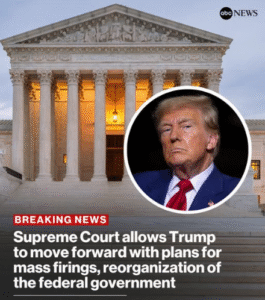The U.S. Supreme Court has cleared the way for former President Donald Trump to move forward with sweeping plans to reorganize the federal government and initiate mass firings of civil servants. In a 6-3 decision, the Court lifted a lower court injunction that had temporarily blocked Trump’s executive order targeting nearly two dozen federal agencies, including Health and Human Services, the Interior Department, and the Social Security Administration.
The ruling does not determine the legality of the reorganization plans but allows them to proceed while challenges play out in lower courts. The executive order, signed earlier this year, gives agency heads broad authority to restructure departments and eliminate tens of thousands of jobs, particularly among career federal employees. Critics argue that the move undermines civil service protections and opens the door to politicizing the federal workforce.
Supporters say the plan is aimed at increasing efficiency, reducing bureaucracy, and reining in what they view as an unaccountable “deep state.” The administration has already begun issuing layoff notices and consolidating programs within major agencies. Some offices have reportedly paused services or closed regional branches in anticipation of broader cuts.
Justice Ketanji Brown Jackson dissented, warning that the Court’s decision could have “irreparable consequences” for the independence of the civil service. Federal employee unions and several cities had sued to block the plan, calling it an unconstitutional overreach that bypasses Congress’s authority over the budget and agency oversight.
The Trump administration has maintained that the president has wide latitude under existing statutes to direct federal operations. Legal observers expect continued court battles, but the Supreme Court’s intervention is seen as a major procedural victory for Trump. As the reorganization takes effect, tens of thousands of jobs could be affected nationwide, and critics warn of long-term impacts on public services and government stability.


